| Srl | Item |
| 1 |
ID:
153891
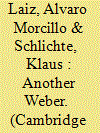

|
|
|
|
|
| Summary/Abstract |
While there has arguably been a partial reception of Weber in international relations (IR), we argue here that his ideas have either been misunderstood or neglected. In order to highlight the most valuable Weberian insights, we focus on two topics of crucial importance to IR. First, in our view, Weber's crucial contribution to the study of states is not his alleged emphasis on the monopoly of violence but his concern with the problem of legitimacy, which is the key to understanding why individuals actually orient an action according to their beliefs in the idea of a state. Second, Weber conducted seminal historical investigations on religion, the rationalization of economic ethics, and organizations that show that the diffusion of isomorphism has little to do with supposedly uninterested and persuasive scientific and professional associations. Instead, more attention should be paid to rational domination and less to reified concepts such as John Meyer's ‘rationalized otherhood’. These arguments are also examined empirically.
|
|
|
|
|
|
|
|
|
|
|
|
|
|
|
|
| 2 |
ID:
101326
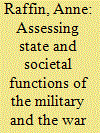

|
|
|
|
|
| Publication |
2011.
|
| Summary/Abstract |
Studies on the military in Vietnam today see a concurrence between the changing role of the army-its growing economic role as well as its role as a tool to control the Vietnamese population-and the changing economy and international environment. How do we make sense of this evolution and its impact on civil-military relations in terms of power relations and authority? This study seeks to provide an analytical framework that shows how the military is not a homogeneous entity but rather is made up of various groups that derive uneven benefits from the post-cold war situation. The author's contribution is primarily at the conceptual level, stressing the dynamics of power relations among the military, society, and state from a Weberian perspective. Doi moi, as an era of economic and social change, has redefined power relations. The author also emphasizes the generational and historical elements in civil-military relations that are specific to Vietnam.
|
|
|
|
|
|
|
|
|
|
|
|
|
|
|
|
| 3 |
ID:
089810
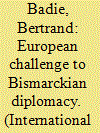

|
|
|
|
|
| Publication |
2009.
|
| Summary/Abstract |
The Middle East crisis is strongly challenging the principles of classical diplomacy, which this paper has identified as a 'Bismarckian diplomacy'. The Palestinian, Iraqi and Afghan conflicts are bearing upon international relations, in a way that highlights the inefficiencies of a diplomatic orientation centred on power and military force. These transformations shed lights on the roots of Bismarckian diplomacy and its main components; they make clear its Weberian affinities and the controversial distinction between a Weberian approach to International Relations and its 'Durkheimian challenge'. This paper will delineate the main features of this new 'Durkheimian diplomacy', its social orientation, and the emphasis it confers on the social dimension of conflicts in the Middle East.
|
|
|
|
|
|
|
|
|
|
|
|
|
|
|
|
| 4 |
ID:
090323
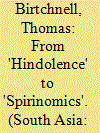

|
|
|
|
|
| Publication |
2009.
|
| Summary/Abstract |
A resurgence in Hindu nationalism in India is accompanying a burgeoning interest in Indian spiritual values in global aspirational and management literature. This article traces the shift in understandings of the economic valency of Indian spiritual values outlining the popular relation of Hindu values to economic growth and management and leadership discourse and practice.
|
|
|
|
|
|
|
|
|
|
|
|
|
|
|
|
| 5 |
ID:
096705
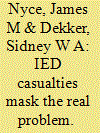

|
|
|
|
|
| Publication |
2010.
|
| Summary/Abstract |
Casualty figures suggest that the US/Allied Counter Improvised Explosive Device (C-IED) policy and the present allocation of national assets, resources, and intellectual capital have not been very successful. A number of explanations for why this has been the case are discussed and critiqued here.
|
|
|
|
|
|
|
|
|
|
|
|
|
|
|
|
| 6 |
ID:
091917


|
|
|
|
|
| Publication |
2009.
|
| Summary/Abstract |
Hans Morgenthau was a founder of the modern discipline of International Relations, and his Politics among Nations was for decades the dominant textbook in the field. The character of his Realism has frequently been discussed in debates on methodology and the nature of theory in International Relations. Almost all of this discussion has mischaracterized his views. The clues given in his writings, as well as his biography, point directly to Max Weber's methodological writings. Morgenthau, it is argued, was a sophisticated user of Weber's views who self-consciously applied them in the sphere of International Relations in such a way that Realism provided an ideal-typical model of the rational and responsible statesman. This interpretation both explains Morgenthau's views and shows them to be a serious, complex, and compelling response to the issues which have animated the controversies over International Relations theory after Waltz's presentation of the methodological basis for his neo-Realism.
|
|
|
|
|
|
|
|
|
|
|
|
|
|
|
|
| 7 |
ID:
079482
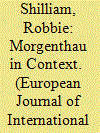

|
|
|
|
|
| Publication |
2007.
|
| Summary/Abstract |
By what criteria might the human condition be considered `tragic'? In this article I argue that historically contextualizing the criteria by which Morgenthau judged the human condition to be tragic requires a sensitivity to what might be called the `international dimension' of knowledge production. Specifically, I argue that Morgenthau's tragic sense of the relation between liberal ethics and the reality of politics was constructed as a reaction to a preceding set of intellectual engagements - exemplified by the political philosophies of Georg Hegel and Max Weber - with the perceived `backward' nature of the `liberal' project in Germany in comparison to that of republican France and capitalist Britain. Through this investigation I argue that inter-societal difference is not simply an object of political theory, but at a deeper level generative in the historical construction of that thought itself. This argument has implications for Morgenthau's recent resurrection as a critical voice on the separation of ethics and politics in International Relations theory
|
|
|
|
|
|
|
|
|
|
|
|
|
|
|
|